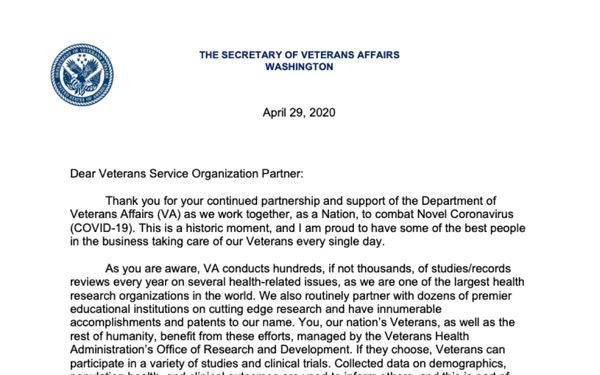The records review reported outcomes where hydroxychloroquine alone was provided to our sickest COVID-19 patients. The Veterans who received hydroxychloroquine were at highest risk prior to receiving the medication.
Robert L. Wilkie – The Secretary of Veteran Affairs, Washington
In a letter sent to veterans organizations, Wilkie clarified that a recent analysis of those hospitalized in Veterans Health Administration medical centers led to misinformation.
The conclusion of the study in question was based on a retrospective analysis of patients hospitalized in Veterans Health Administration medical centers with confirmed COVID-19 infections. The study has not been peer-reviewed.
His letter read as follows:
Dear Veterans Service Organization Partner:
Thank you for your continued partnership and support of the Department of Veterans Affairs (VA) as we work together, as a Nation, to combat Novel Coronavirus (COVID-19). This is a historic moment, and I am proud to have some of the best people in the business taking care of our Veterans every single day.
As you are aware, VA conducts hundreds, if not thousands, of studies/records reviews every year on several health-related issues, as we are one of the largest health research organizations in the world. We also routinely partner with dozens of premier educational institutions on cutting edge research and have innumerable accomplishments and patents to our name. You, our nation’s Veterans, as well as the rest of humanity, benefit from these efforts, managed by the Veterans Health Administration’s Office of Research and Development. If they choose, Veterans can participate in a variety of studies and clinical trials. Collected data on demographics, population health, and clinical outcomes are used to inform others, and this is part of what makes VA one of the most effective and innovative health care systems in the Nation.
Recently, a records review was posted on a public website at the request of the New England Journal of Medicine, out of one of our medical centers. The review documented some initial findings on the use of hydroxychloroquine for treating COVID19 that gained a lot of media attention.
This led to misinformation about what did and did not happen at VA, and what the findings indicated. I would like to update you directly and provide the following:
• This was not a clinical trial. It was an analysis of retrospective data regarding hospitalized patients. The findings should not be viewed as definitive because the analysis did not adjust for patients’ clinical status. It has also yet to undergo peer review, which would assess the quality control measures needed for a suitable scientific publication.
• Second, this report on a retrospective record review was a description of treatment practices and outcomes rather than an “experiment.” The cohort studied exclusively included COVID-19 patients who were admitted between March 11, 2020 and April 11, 2020 across VHA. All cohort members were Veterans with a median age of 58 years old. All were men.
Page 2.
• The records review reported outcomes where hydroxychloroquine alone was provided to our sickest COVID-19 patients. The Veterans who received hydroxychloroquine were at highest risk prior to receiving the medication. This was done with informed consent of the Veterans or their families, and in accordance with protocols established for “off label” uses of routinely used medications.
• Hydroxychloroquine is not an “experimental drug.” It has been in use for years to prevent or treat malaria, lupus, rheumatoid arthritis, and related conditions. Many of you may have taken it as part of your service overseas.
• U.S. Food and Drug Administration guidance states: “[Hydroxychloroquine and chloroquine] are being studied in clinical trials for COVID-19, and we authorize their temporary use during the COVID-19 pandemic for treatment of the virus in hospitalized patients when clinical trials are not available.” o Source: https://www.fda.gov/drugs/drug-safety-and-availability/fdacautions-against-use-hydroxychloroquine-or-chloroquine-covid-19-
outside-hospital-setting-or.
• VA is adhering to these guidelines, only using hydroxychloroquine to treat COVID-19 in cases where Veteran patients and their providers determine it is medically necessary.
• Use of this medication for treatment of COVID-19 is considered “off label” – perfectly legal and not rare (20% of all medications prescribed). Another example of “off label” is using aspirin once a day to reduce the chance of a heart attack.
I hope this provides useful context in interpreting some of the news reports surrounding the VA study. Our number one priority is keeping Veterans, their families, and our staff safe and healthy.
Thank you again for your support for VA and service to our Nation.
Sincerely
Robert L. Wilkie

